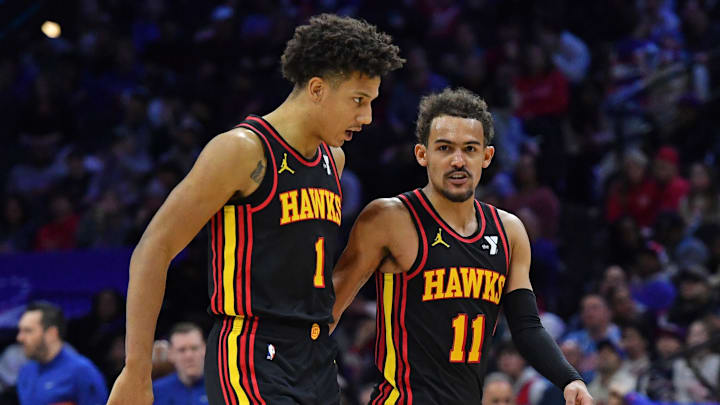The Atlanta Hawks have had a stellar 2025 offseason, supplementing their talented starting lineup from last season with the depth the Hawks have sorely lacked. Now, the Hawks' front office faces a new challenge: how do you approach the critical 2026 offseason without compromising talent?
Trae Young and Dyson Daniels are both extension-eligible as they enter the final year of their contracts. Young is eligible for a 4-year, $229 million extension and could qualify for a 5-year, $345 million supermax if he makes an All-NBA team next season. Daniels is projected to earn around $30 million annually after Jabari Smith Jr. set the market for extending the draft class of 2021.
Jalen Johnson enters the first year of a 5-year, $150 million extension next season. Zaccharie Risacher, Onyeka Okongwu, and Nickeil Alexander-Walker will be earning a combined $42 million next season. Depending on how contract negations pan out, the Hawks could have a bill of over $150 million in 2026 for those six players, leaving Atlanta with just $15 million in cap space to fill the other nine full-time NBA roster spots.
The Hawks are not in immediate danger; in fact, they are in prime position to compete for a title this season. But, if they want to be competitive for the remainder of Trae Young's prime, they cannot overextend and set themselves up for failure. The Suns are a warning sign of just how quickly a team's fortune can change when you have reached this stage of team building. Just four years after making the Finals, the Suns have no path to contention and will likely waste the end of Devin Booker's prime.
Atlanta must carefully manage their books to remain competitive
The Pacers and Thunder showed the blueprint for building a contender this season. Similar to the Heat teams that made the Finals this decade, the two conference champions embraced depth over star quality. This strategy is ideal, as it allows for flexibility in prioritizing different players depending on the playoff matchup and reduces the impact of a single injury on the team's outlook.
The Hawks, however, are unlikely to replicate this strategy as their players are simply too good. The Pacers only have two players earning over $20 million in 2026, whereas the Hawks have three next season, with Dyson Daniels likely to replace Kristaps Porzingis's place in the cap. In a few years, Zaccharie Risacher will be due for a contract, adding a fourth high earner to the balance sheet.
The Hawks could potentially have some cap flexibility for the next couple of years, with Porzingis presumably set for a pay cut following this season, assuming he even stays in Atlanta. However, when Risacher is due for his extension, the Hawks will likely find themselves over the second apron and locked in with their roster at that time.
The Hawks must balance building the best team with maintaining financial flexibility. While there are no immediate threats, the Hawks must avoid the trap the Suns fell into during the Kevin Durant era. Top-end talent is essential, but perhaps equally important is having a quality bench to relieve your stars. The Pacers advanced to the Finals not with star power, but with a team that had seemingly infinite playoff-caliber players that worked together seamlessly.
Deals like the Luke Kennard deal will not be possible in the future. While Kennard was certainly overpaid, he was signed to a one-year deal, meaning there are no long-term consequences from this deal. After granting Young and Daniels their extensions next summer, Atlanta will no longer have the luxury of overpaying for a one-year rental. Onsi Saleh and the Hawks front office will instead have to trade for players of that pay grade, which necessitates giving back assets.
The Hawks are in a great position as we advance, but so were the 2021 Suns when they fell just short of a Finals victory. Poor financial management, however, led the Suns to have one of the gloomiest outlooks in the league just four years later, still in Booker's prime. Saleh has put together an impressive resume in his short tenure as GM, but he had a great deal of cap space and promising young talent to work with. Now, Saleh must work carefully for the Hawks to have long-term title hopes.
